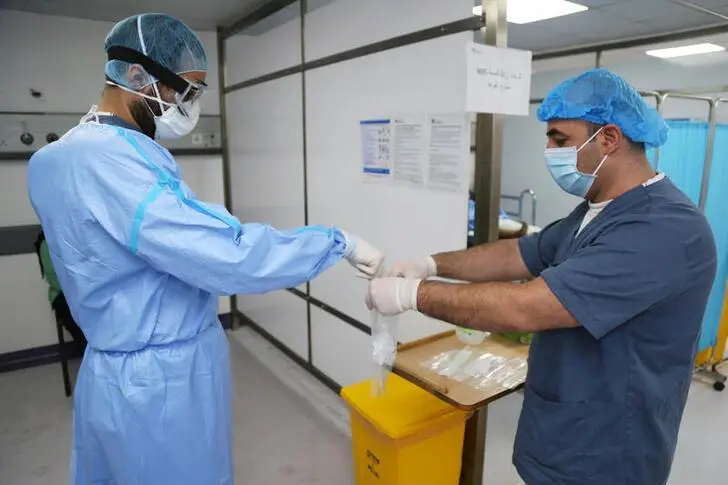PHOTO
BEIRUT: With medicine shortages looming in cash-strapped Lebanon, Dr. Rita el-Khoury, owner of a pharmacy in Kesrouan, is grappling with a daily moral dilemma: to choose between selling her dwindling supplies of vital medicine to long-term clients, or to new customers who she fears may be stockpiling drugs ahead of shortfalls.
I noticed the hoarding started about a month or two ago. Were at a point now where were running out of medicine, says Khoury, 35, who has owned her small-town pharmacy for nine years.
People started demanding from us to prepare an additional two or three months of medicine instead of one, she explains, adding that the main medicines flying off the shelves are for treating chronic diseases including diabetes, cholesterol and high blood pressure.
Khoury says she typically has around 500 regular clients. But for the last two months, she says that at least 60 percent of patients coming in are new.
Ive never seen them before and they are going from pharmacy to pharmacy, asking for drugs that are out of stock, she adds.
The disappearance of medicine is the latest consequence of the economic crisis, the worst in Lebanons history.
The Economy Ministry has predicted that 60 percent of the population will be living below the poverty line by the end of 2020, while the ongoing collapse of the national currency has made many basic food and household items unaffordable for those without access to dollars.
Until now, the cost of medicine in Lebanon has been insulated from soaring inflation by the Central Bank, which has given medical importers preferential access to dollars at the official rate of LL1,507.5. While the Central Administration of Statistics calculated year-on-year inflation at 120 percent in August 2020, the price of medicine increased by only 1.4 percent over that period, thanks to this subsidy.
But Banque du Liban Gov. Riad Salameh is now saying that there are not enough foreign exchange reserves to continue this beyond two or three more months. With the lifting of subsidies, medicine prices are expected to skyrocket.
The head of the Syndicate of Pharmaceutical Importers, Karim Gebara, tells The Daily Star that people started panic-buying medicine primarily to treat chronic diseases because of anticipated drug shortages and price increases. Stockpiling and the smuggling of subsidized drugs to make a profit are also contributing to shortages. The Internal Security Forces Sunday arrested six Egyptian nationals who were smuggling hundreds of boxes of regular painkillers out of the country.
Unfortunately, many patients have started going from one pharmacy to another, buying a single pack from different pharmacies, Gebara explains. Those who have the financial means have stockpiled their requirements for a year.
The syndicate first began noticing the surge in demand at the beginning of September. In the first week alone, one month of consumption was dispensed from pharmacies, Gebara said. We used to have three months of stock in our warehouses. That number has now dropped to a month and a half.
The unions representing pharmacists, physicians and pharmaceutical importers in Lebanon have since put a one-month cap on the prescription, purchase and delivery of medicine.
Making matters worse, Gebara explained that drug supplies had already been running low for nine months because BDL had been slow in releasing the subsidized dollars available to importers. He says payments on average are taking two months to process, causing a delay in shipments and further depleting the stocks in local pharmacies.
Khoury says that her pharmacy now waits up to 10 days for suppliers to deliver, whereas two months ago most of her orders would arrive in less than two days.
A BDL source confirms the reason for these payment delays is that the bank is overwhelmed with invoices.
There is a delay in payments because we have thousands of files we need to process. We need to make the necessary verifications for each invoice to make sure they have not been duplicated, the source says.
How long this can last is, of course, the question that has been on everyones mind. Lebanon is no longer receiving the level of remittances that kept its economy afloat for years and produces very little for export.
Subsidies on imports of medicine, wheat, fuel, a basket of around 200 basic consumer goods, and raw materials for agriculture and industry are largely responsible for around $10 billion drop in BDLs foreign currency reserves between Jan. and Sept. 2020. According to its Sept. 30 interim balance sheet, BDL now has only $20.9 billion of foreign assets, including $17.5 billion in required reserves that cannot be used.
Having subsidies like this is very rarely sustainable. Youre subsidizing fuel, wheat and medicine for an entire country when the country doesnt have any way of generating dollars, Mike Azar, a former Johns Hopkins SAIS professor of finance says. Reserves started falling a year ago. This shouldnt be a surprise to anybody; this was always going to be the end result.
Azar adds that only two weeks ago he had to go to several pharmacies before he could find medication for his 93-year-old grandmother who lives in Tripoli. Her regular pharmacy was out of stock, which he said had never happened before.
People are living in denial about where this situation is potentially headed. Its an intersection of so many crises happening at the same time, Azar says. Its a catastrophe.
Copyright 2020, The Daily Star. All rights reserved. Provided by SyndiGate Media Inc. (Syndigate.info).





















